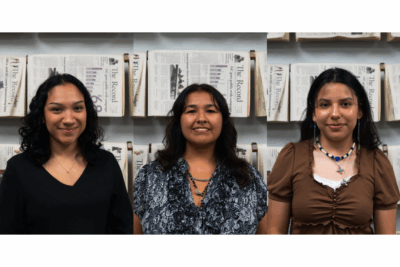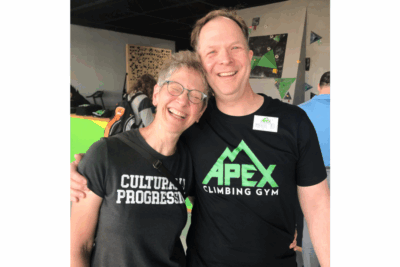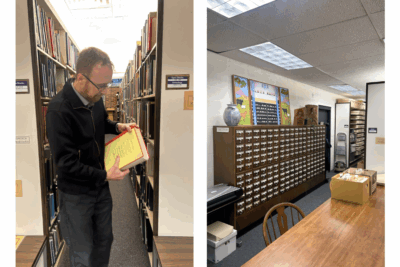For most ASL students, the spring semester of their senior year is spent at an internship somewhere across the country.
This semester, five students, Adriene Hendricks, Bryan Palmer, Danielle Kerschhackl, Jessica Morrin and Lydia King, have placements in a state other than Indiana. Hendricks is in Detroit, Michigan; Palmer is in Boston, Massachusetts; Kerschhackl is in Miami, Florida; Morrin is in Greensboro, North Carolina; and King is in Knoxville, Tennessee.While the students are at their internships interpreting for a number of Deaf clients, they keep in contact with Colleen Geier, program director and a professor of ASL interpreting.
“I’m here when they need me,” Geier said. “But they have to take a lot of ownership of their own internship experiences.”
Those experiences have provided both rewards and challenges for these students.
Kerschhackl has been interpreting for people at medical appointments, school board meetings and a number of other places. She has learned to be more flexible, but doesn’t appreciate the traffic in Miami.
“Normally I’m someone that really likes a set schedule,” Kerschhackl said. “If you say you’re going to be here at this time, then you need to be here at this time.”
But one morning, after waking up at 5:30 a.m. to make it through traffic for an 8:00 a.m. appointment, Kerschhackl found that not everyone has those same standards. The client she was supposed to meet with never showed up, which left Kerschhackl annoyed.
“This internship taught me patience and just how important it is to be flexible,” she said. “But it has also taught me that in the real world, if that person doesn’t show up, I still get paid.”
While Kerschhackl has learned to be more flexible, she’s also overcome the challenge of different signing styles.
“In the Midwest, there’s a certain way of signing things; different words have specific signs (the Midwest accent),” she said. “Down here, most people’s signs have a Southern accent. So certain signs just aren’t the same.”
Through exposure, Kerschhackl has been able to learn from the Deaf community, sign language students in the area and other interpreters in order to learn news signs.
“I like knowing my skills are improving,” she said. “I love the amount of exposure I’m getting. Everyday is something new and that’s the best part about it.”
Like Kerschhackl, Palmer has been doing similar work at his internship in the Boston area. While Palmer is interning with Partners Interpreting, he has been interpreting classes, observing medical appointments and doing other things of that nature.
“It’s been really cool just to use sign language all the time to communicate,” he said.
Out of the eight people Palmer works with, four of them are Deaf, which has added to his experience.
“It’s just a good experience working alongside Deaf people, to be able to communicate with them and throw ideas off of them,” he said. “If you want to become fluent in sign language, you have to use it, and the people who own this language are the Deaf community. To be able to socialize and work with them on a daily basis, it’s a great opportunity.”
One of the challenges for Palmer is being able to gage to his improvement when the people he works with are nationally certified interpreters.
“It’s like a high school baseball player trying to hit off of a major league pitcher,” he said. “It’s a tough comparison, and I want to be able to measure where I am.”
But through the internship program Geier has asked that the students have three evaluations done throughout the semester. Those evaluations have allowed Palmer to step back and realize that he’s improved quite a bit.
King has also been participating in a similar way to that of Palmer and Kerschhackl, only based in Knoxville. Through her internship with the Knoxville Center of the Deaf, King’s main assignments are medical appointments, which include routine doctor visits, eye exams, and physical therapy. However, these assignments vary day to day, which is something King values.
“My favorite part of the internship is the variety with each job and client,” King said. “There is a phrase used a lot in our profession, and any interpreting student knows it by heart because it’s the answer to almost all questions we ask: ‘It depends.’ Every situation is different.”
But King’s semester hasn’t been without its challenges. She names herself as her biggest obstacle.
“Interpreting requires confidence and courage to try one’s best with the possibility of making mistakes, fixing those mistakes and learning from the experience,” King said. “Those are hard skills to develop, and the only way to improve upon them is to experience the good and bad and learn from all of it.”
Another valuable experience King had this semester was interpreting on a cruise for 65 Deaf people, alongside Geier and Mia Engle, a recent GC graduate.
“I worked alongside other interpreters who offered not only professional support, but went above and beyond and essentially took me under their wing,” said King. “I learned many things are key to being a successful interpreter. Not only does one need the skills and knowledge, but what makes an impression is a good attitude towards clients and other interpreters.”
King noted that her time in the ASL program at GC provided her with those tools necessary to be a good interpreter.
For Geier, the best part of the cruise was being able to work with Engle and King.
“They both did a great job,” said Geier. “I was so proud to see them working. At GC, we’re producing high quality entry-level interpreters and internship is a big part of that.”


